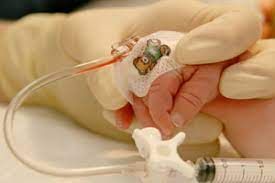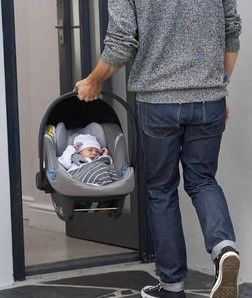Screening for Infection in Newborn Babies
Wales Maternity & Neonatal Network
This information leaflet is for parents of babies who may need additional observations or treatment for infection in the first days following birth.
Why is My Baby Being Observed or Treated For Infection?
A small number of babies become unwell after birth because of infection from bacteria. Fortunately, this is rare, occurring in only 1 in 2000 babies. There are a number of things that can put a baby at higher risk of having an infection, such as:
- The mother’s waters broke more than 24 hours before the baby was born.
- The mother is a carrier for a bacteria called Group B Streptococcus and has not received antibiotics.
- The mother has an infection at the time of delivery.
- The baby is premature (born before 37 weeks)
It can be difficult to predict which babies will get an infection and become unwell, but the midwives, nurses and doctors caring for you and your baby will be able to decide whether your baby should be monitored more closely for 24 hours, and sometimes babies may need blood tests and antibiotics.
What Happens if My Baby Is ‘Being Monitored More Closely’?
Your baby will be observed for 24 hours in the postnatal ward and will stay with you. The midwifery team will monitor for any early signs of infection at regular intervals and will inform the neonatal team if they are concerned. If your baby remains well, the regular observations can be stopped. However, if your baby shows any of the signs shown below, a member of the neonatal team will be asked to see your baby and to decide if he/she should have blood tests and antibiotic treatment.
Signs of an infection after birth include:
- Having difficulty with breathing
- Having too high or too low a temperature
- Being lethargic or floppy
- Feeding poorly
- Having a poor colour
Starting Antibiotics
If your baby needs antibiotics, a small plastic tube (Cannula) will be passed into a vein in your baby’s hand or foot. This is used to give the antibiotics as an injection. It is better for newborn babies to get their antibiotics in this way, rather than as a medicine to swallow, because their stomachs may not absorb medicines very well.

The antibiotics we usually use are called Gentamicin and Benzylpenicillin. At the same time as putting the cannula in place, blood samples will be taken to test for infection. If your baby remains well, and the blood tests are negative for infection, then the antibiotics are usually stopped after 36-48 hours. However, if the results show signs of infection, your baby may need to stay on antibiotics, and may also need more tests to try to find out where the infection has come from. A course of antibiotics usually last for 5-7 days but can sometimes last longer. Please discuss this with your Neonatal team or midwife.
Your Stay on the Postnatal Ward
As your baby will be with you most of the time it’s worth bearing in mind some things you may notice which may alert you to seek help for your baby:
- Behaving different to normal, such as being irritable or tired
- Not interested in feeding, or not taking feeds as well as they used to
- Vomiting
- Becoming too hot or too cold
- Looking pale
- Unusual jerking movements
- Becoming floppy
- Breathing quickly or having difficulty breathing.
If any of these things happen, or if you are concerned for any other reason, please let the nurses, midwives or doctors know.
Unless your baby becomes more unwell he/she will stay with you on the ward. You can feed, change, and care for your baby as you would normally. Your baby may need to be taken elsewhere briefly to have their antibiotics but then will be brought straight back to you.
Time to head home

Once the doctors are happy that your baby does not have an infection, they will stop the antibiotics. We may advise you to stay with your baby for another 24 hours but in most cases, we will aim to let you go home on the same day the antibiotics are stopped. Once you get home, please try to remember the signs of infection shown in the list above. If you are concerned, ask for advice about what to do next. You can contact your GP, call NHS 111 or go to your local Accident and Emergency department.
Any questions
If there is anything you are not sure about, please feel free to ask one of the doctors, midwives or nurses looking after your baby




